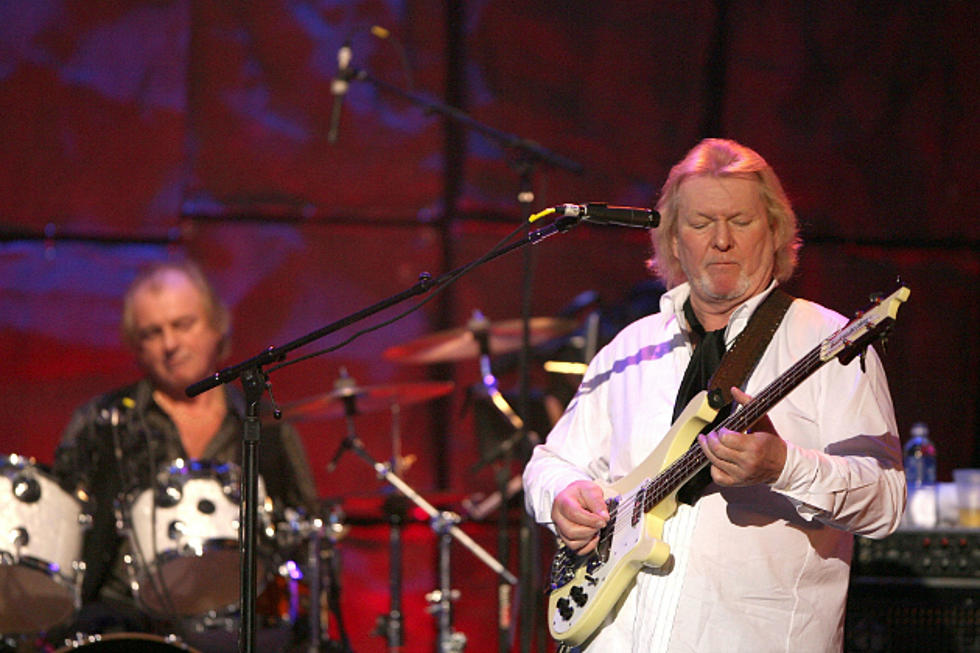
Chris Squire: An Alternative Appreciation of the Late Yes Bassist
Chris Squire, the only member of Yes who appeared on every one of the band's studio albums, passed away June 28. He was the only constant in a band whose lineup changed regularly almost from its very beginning in 1968.
Yes and their prog rock peers personified the rock excesses that triggered England's punk explosion in 1976, with their big shows and extended solos. Buzzcocks guitarist Steve Diggle recently told us:
The whole reason we started was that back in like ’75, you had those kind of progressive bands like Yes.... They had good moments, but the landscape was a bit barren really, it was a bit lost....What happened to making music when it’s three minute songs, or whatever – singles – and smashing the equipment and making a bit of excitement? People were singing about mushrooms in the sky and things like that."
But Squire was a towering talent, both literally and figuratively. At 6'5", he was an imposing presence, but the only thing intimidating about him was his technical prowess. A bassist's bassist, Squire spent his entire career on "greatest players" and "major influences" lists, and not just the lists of artists and journalists. Punks and post-punks alike held Squire in high esteem, regardless of how they may have felt about his band or the prog genre in general.
Nigel Bennett was there when the punk-prog wars were happening; in fact, as guitarist for punk legends the Members he had a front row seat. Rather than adversaries, the two musicians developed a friendship. Bennett told Diffuser:
The Yes Album was played a lot at my school, and I learned to play 'The Clap" by listening to it over and over again. I liked all music that had good guitar playing in it when I was young, and still do to this day.
Some years later I met Chris and he was a fun guy. The first time I went to his house in Surrey we rode in his beautiful old red Rolls-Royce. He showed me around the place, and it was the first fully equipped 24 track studio I had seen, albeit covered in dust.
He was funny and a great bass player.
Squire was a rarity in the traditional rock world -- a bassist who used a plectrum, or pick. This gave his bass lines a harder attack than most finger-style players manage, an aggressive tone that found its way into alternative music. The punks may not have adopted Squire's gymnastic runs up and down the fretboard, but everyone from Dee Dee Ramone to Jane's Addiction's Eric Avery played bass with a plectrum.
Rage Against the Machine bassist Tim Commerford singled Squire out in a recent interview with For Bass Players Only:
I don’t play with a pick at all. Chris Squire is the only pick player that I like. I don’t even consider using a pick on the bass as bass playing; that’s more like playing guitar on the bass. But (Squire) had that that kind of pick/thumb together that made this just unbelievable sound. Like “Roundabout,” the bass sound on that is still one of my favorite bass sounds of all time, just the tone of it.
"Roundabout" stands as perhaps the most towering achievement in Squire's nearly 50-year career. No less a figure than alternative music's bass virtuoso, Les Claypool, holds both the player and the song in high esteem. Speaking to Music Radar, the Primus bassist said:
When I grew up that was a rite of passage to be able to play "Roundabout" and I was never able to play it. I mean I could play it but I wasn’t playing it correctly and I still don’t know the whole thing in its entirety but that’s one my favorite riffs to go to every now and again.
His presence, his tone is huge, his phrasing, it’s just spectacular. He is the reason why I listen to Yes.
R.E.M.'s Mike Mills echoed Claypool's sentiments in a 2006 interview with his hometown newspaper, the Athens Banner-Herald. When asked about his influences, Mills said, On a bass player-level, I'd have to say Berry Oakley (Allman Brothers Band), Paul McCartney ... Chris Squire, even, from Yes - I didn't like the band, but I liked his bass-playing."
The respect between alternative musicians and the Yes legend was reciprocal. In a Q&A about his bass inspirations, Squire gave a nod to a pair of artists who followed in his enormous footsteps:
A couple of guys that I’d like to mention who are younger than myself are Flea from Red Hot Chili Peppers (‘Higher Ground’) and Tony Kanal of No Doubt (‘It’s My Life’). Both of these two are fantastic live and well worth buying a ticket to see. I recently found out that Tony grew up where I grew up in the northwest suburb of London, Kingsbury.
For music fans of a certain age, Chris Squire was simply ubiquitous. His music is woven so deeply into the fabric of our lives that it can't be contained in a little box marked "prog" or "oldies" or even "not alternative." It's an essential part of the soundtracks to our lives. When asked about his childhood bass heroes, the Replacements' Tommy Stinson told the Dallas Observer: "The first one I can remember is Chris Squire from Yes. My brother [Bob] really cranked that crap out on me. I still like listening to Yes. It reminds me of him."
Funny, talented, and massively influential, Chris Squire's passing is a loss for the entire music community, fans and players alike. Rest in peace, big man, we'll miss you.
More From Diffuser.fm









